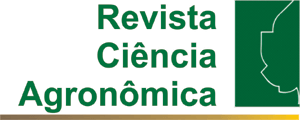ABSTRACT
The soils in the state of Espírito Santo, Brazil (ES) display low natural fertility, which often limits the production of the crops due to the deficiency of some elements. However, they have a high potential for agricultural production when the chemical limitations which are present are overcome. The aim of this study was to describe the spatial variability of the macronutrients calcium (Ca), magnesium (Mg), phosphorus (P) and potassium (K) in a crop of conilon coffee (Coffea canephora Pierre) located in the rural area of the city of São Mateus, ES. The experiment was carried out on a crop, planted at a spacing of 1.8 x 1.0 m (5,555 plants ha-1). A rectangular grid of 61.6 x 20.0 m (1,232 m2) was considered, with 60 sampling points, spaced 5.6 m apart between rows and 5.0 m within each crop row. At each point in the sampling grid, soil samples were collected at a depth of 0.00-0.20 m. All the macronutrients under study displayed a strong spatial dependence. The greatest range of spatial dependence was observed for Mg (32.4 m) and the smallest for Ca (8.1 m). Study of the spatial variability of the chemical properties of the soil by geostatistics, using kriging, proved to be an important tool in understanding the spatial distribution of macronutrients in the soil, and may be crucial in aiding the decision making that helps to attend the nutritional requirements of the conilon coffee crop.
Key words:
Geostatistics; Chemical attributes;
Coffea canephora






